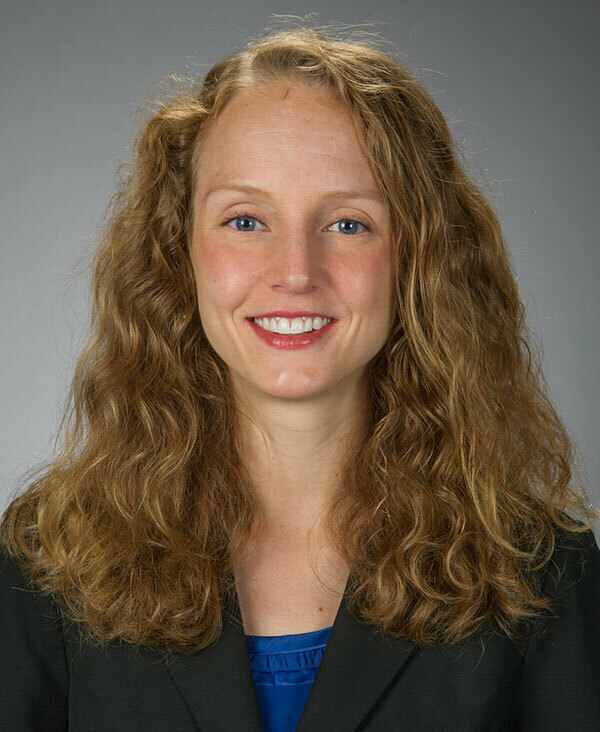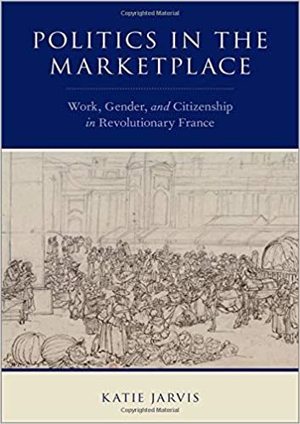
Katie Jarvis, an associate professor in the Department of History, has been awarded the Louis A. Gottschalk Prize from the American Society for Eighteenth-Century Studies for her book, Politics in the Marketplace: Work, Gender, and Citizenship in Revolutionary France.
Winning the Gottschalk Prize was especially thrilling, Jarvis said, because the award committee is composed of scholars from multiple disciplines.
“It’s an honor to know my research resonated with scholars beyond my subfield who also work on the 18th century,” said Jarvis, who is a fellow in the Kellogg Institute for International Studies and the Nanovic Institute for European Studies. “As a historian, I’m also aware of the award’s 43-year history, and I admire many of the winners whose works are now considered classics in my field.”
Politics in the Marketplace is the first study of the Parisian market women — the Dames des Halles — during the French Revolution. In it, Jarvis explores how the Dames’ political activism and economic activities shaped the nature of nascent democracy and capitalism through daily commerce.
The book itself is revolutionary, the judges wrote in a press release.
“Jarvis’s masterful prose is novelistic in its ability to conjure up the market stalls of Revolutionary France with upholstered descriptions of objects and things,” they wrote. “Offering a reassessment of the political role of the Parisian market women, Jarvis develops a new conception of Revolutionary citizenship based in public service and social experience.”
While nearly all histories of the French Revolution mention the Parisian market women — and frequently point to their pivotal interventions in key political demonstrations like the march to Versailles — Jarvis wanted to delve deeper into their role, as an act of historical recovery.
“Most scholarly and contemporary accounts deploy the market women as romantic sprinklings of popular class grit or simply as evidence that women were present,” she said. “I wanted to know who these crucial players were who seemed to be everywhere in passing, yet nowhere in substance.”
“Most scholarly and contemporary accounts deploy the market women as romantic sprinklings of popular class grit or simply as evidence that women were present. I wanted to know who these crucial players were who seemed to be everywhere in passing, yet nowhere in substance.”

As Jarvis tracked the Dames des Halles across multiple archives and pieced together their occupational labor and collective activism, her questions became much broader. She explored how, at the cusp of modern democracy and capitalism, everyday individuals integrated themselves socially and economically into the body politic and how they merged the budding social contract between citizens and the state with the economic contracts of marketplace trade.
“The 1,000 Dames des Halles held great political and economic influence in the revolutionary capital,” she said. “During the Revolution, they used this influence to frequently petition the National Assembly over crucial issues like money and food prices, to animate revolutionary festivals with songs and bouquets, and to smoke out counterrevolutionaries in the streets.”
With support from a 2019 American Council of Learned Societies fellowship, Jarvis is now working on her next book project, Democratizing Forgiveness: Reconciling Citizens in Revolutionary France. Building on her first book, she argues that, amid conflict, the French Revolution forged modern politics and society by reinventing reconciliation.
The recognition she’s garnered for Politics of the Marketplace is a direct reflection of the support she’s received at Notre Dame, said Jarvis, who also served as a fellow of the Notre Dame Institute for Advanced Studies in the fall semester of 2016.
“The Institute for Scholarship in the Liberal Arts partnered with the Department of History to bring in scholars of the French Revolution to read a full draft of the manuscript and to participate in a roundtable on the current state of the field for undergraduates, graduate students, and faculty,” she said. “A Nanovic Institute grant allowed me to conduct summer research in Paris, and history department funds allowed me to present at multiple conferences in the U.S. and Europe where I gained valuable feedback. And my colleagues in history, at Nanovic, and at the Notre Dame Institute for Advanced Study all shared their insights.
“Without the intellectual and institutional resources of Notre Dame and the College of Arts and Letters, it would have been impossible to complete a project of this caliber.”
Originally published by at al.nd.edu on April 29, 2020.